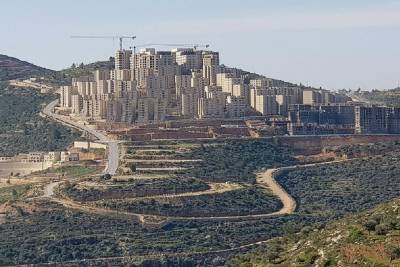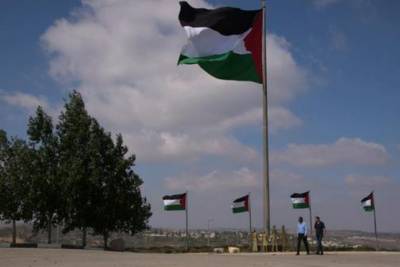Rawabi, the first Palestinian city of the modern era
LA NACION - Jana Beris - The hills are still empty, only stone and earth. Few passersby happen along occasionally. But in this empty place, engineer Bashar el-Masri has already found the realization of his dream - Rawabi (which means "hills" in Arabic ), the first Palestinian city in the modern era, built by Palestinians themselves.
The project envisages construction of 6000 housing units - one thousand of them for upper income and the remainder for middle-income people. The city will ultimately house more than 40,000 people, with modern and accessible facilities situated in an area of 6.3 km2, all less than 10 kms away from Ramallah, just a short 10 minute drive from the city.
"I’m confident that our project is only the initial phase – I have no doubt that in future there will also be Rawabi II and III. Rawabi is the symbol of the future, a new way of realizing the dream of our own Palestinian state. We may bring hope to others and serve as an example for them," says Masri to La Nation when we were received in his large and modern office in Ramallah, located in one of the best residential neighborhoods in the city.
Masri, 48, a successful Palestinian businessman, is originally from Nablus and serves as General Director of Massar International and its subsidiaries, including “Bayti” Co. (which means “my house”). Bayti is leading the Rawabi project, and the combination of technical and human resources is working well. “Rawabi accomplishes so many different objectives for Palestine. We are creating jobs, helping to solve the housing shortage, improving people’s living standard and, if things go as we hope, managing to make a reasonable profit, which will allow us to continue with new, similar projects in the future”, says Amir Dajani, deputy chief executive of Bayti.
Dajani, 38, speaks with infectious enthusiasm about the project, referring to its many benefits and unique character in superlatives. "This is the most promising approach to improve the living standards of our people, to give hope, to provide excellent growth opportunities for young
Palestinians, who are very enterprising," he said confidently.
The beginnings. It started as a daring dream. Masri’s partners, when he first shared his idea, initially asked if he had gone mad. "’Don’t give us all a big headache’, they told me” said Masri seriously. "They asked, ‘Do you have any idea how many things can and probably will go wrong with this kind of a project, something of this size’?
He answered them, without hesitation "Yes, at least a hundred. But let’s look at them as challenges, not obstacles, and simply face them one at a time.” Before long, Masri said, everyone was on board and everyone at Bayti was engaged in an all-out work effort, with large team of engineers, architects and international consultants throwing out all the stops to get the Masterplan developed and the project underway.
Dreams. The special spirit of this endeavor has infused many young couples who are already displaying great interest in the prospect of owning a home in Rawabi. “They are ready and willing to sign a formal contract on their new homes, even before construction has begun”, says Dajani.
Among these youths are Ikhlas Hassoun (28) and Abdel Saher Hadi (29), who married two years ago, and who welcomed us into their rented apartment in Ramallah.
"We are quite comfortable here, but we don’t own this apartment. We can’t make any long-term plans, at least not without asking permission from others”, said Saher. “We simply want our own space where we can live in peace and quiet. Nothing else.”
Ikhlas, who listens carefully to her husband, added, "This city will be something new; pure air, the mountain view, together with everything we need, on site, without having to leave the city…unless we want to." Sami, the couple’s young toddler of 16 months, demanded his mother’s attention. “He’s small now, but very soon, it will be important for him and for us to have the parks and green space where he can play safely in a healthy atmosphere out of doors.”
Wael, one of Bayti’s drivers and logistics support team members, dreams about his move. The bulldozers have not yet begun to work, but he knows it's only a matter of time. "Here at Bayti, they are serious about everything they do. I know firsthand that this group gets its work done.
My bride and I dream about life in Rawabi, although it might be a couple of years before we can enjoy it. I’m actually very happy to be a part of this group, to be a part of the change, not just to benefit from it,” he said.
Barriers. The company is committed to delivering the first homes 24 months after starting construction. The original plan was to start in October, but Amir Dajani explains that they are awaiting the final official confirmation from Israel. Construction of the city itself, which is located in Area A(under full Palestinian jurisdiction), does not require authorization from the Israeli government. But what does require authorization is the construction of a direct access road which will link Rawabi to Ramallah, but which, part of it must run for 3 km through Area C (under Israeli jurisdiction).
"The Israelis have given us a clear message that there is no problem and we hope that formal permission to construct the road will very soon materialize," says Masri. "Ordinary Israelis with whom we often interact sincerely wish us luck with this project. They understand what it means for us as Palestinians, and a lot of them realize that a better life for Palestinians means a better life for them, too.”
In the dynamics of daily life, a working relationships between the Palestinians and Israel is seen as inevitable. Raw materials for construction must pass through Israeli ports, and Bayti knows that they will utilize some Israeli technology in construction. "I think the opportunity arises for us to have a successful relationship with Israel, but we have waited for far too long simply to clarify the political situation," said Amir Dajani. "If new political policies lead us to new opportunities for cooperation and the exchange of business ideas, the benefits to both sides will be huge. If there is no improvement, no change, we simply have to work within the framework of challenges we face today. But either way, we will go forward. It’s just a matter of how quickly.”
Masri is more cautious. He has suffered for years firsthand the economic impact of political crisis between Israelis and Palestinians. Only his business acumen saved his enterprises from ruin.
"I know everything can change overnight. I’ve seen it happen. So I say I'm neither optimistic nor pessimistic, but realistic. “We have to try something new," he emphasizes. "With all due respect and gratitude to the international community, we have already seen that to remain victims will not help us. It is high time we learn to use Palestinian human resources for our own good and to work through peaceful means. This is the only real leadership.”
Saher and Ikhlas have already told many friends about their plans to move to Rawabi and are encouraging those friends to make plans to move with them. "We want to live in peace, although we are aware that our lives will probably not remain free of problems. We know that, but regardless… we must try to live in peace."
To view original article in Spanish, Click Here.
To view original translated article, Click Here.



